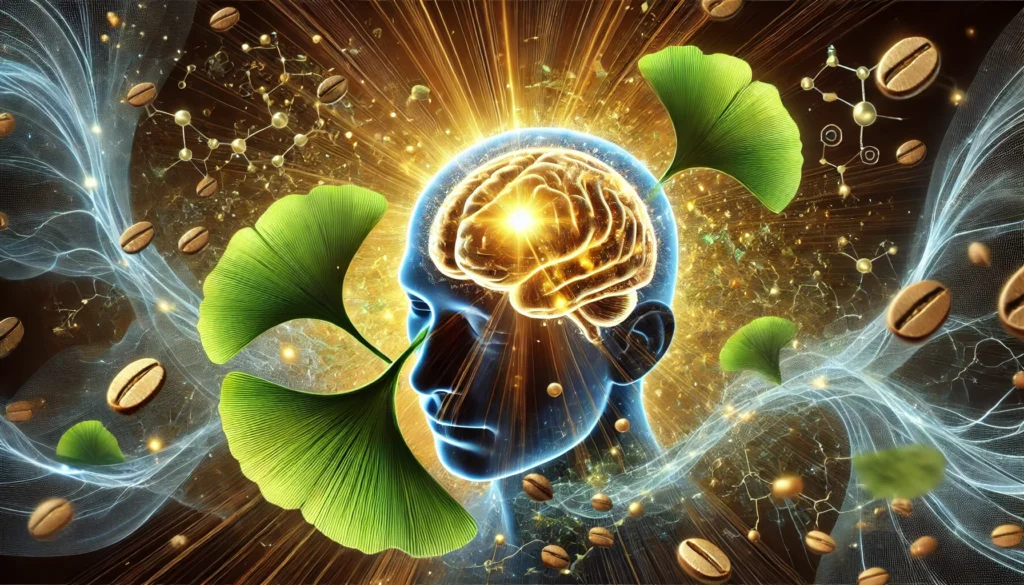Introduction: The Cognitive Power Duo for Modern Minds
In a world where mental sharpness and creative thinking are critical for success across industries and disciplines, the demand for cognitive enhancers has surged. Among the most researched and widely used nootropic agents are caffeine and Ginkgo biloba. Caffeine, a stimulant naturally found in coffee, tea, and certain plants, is celebrated for its ability to improve alertness and concentration. Meanwhile, Ginkgo biloba, an extract derived from the leaves of the ancient Ginkgo tree, is renowned for its potential to enhance memory, circulation, and overall brain function. When used together, these two substances form a synergistic duo that holds promising potential for those seeking to boost both focus and creativity.
You may also like: Ginkgo Biloba Benefits for Creative Thinking: How This Ancient Herb Supports Cognitive Clarity and Focus
While caffeine’s role in increasing energy and attentiveness is well understood, Ginkgo biloba’s more nuanced effects—especially on blood flow and neuroprotection—have generated both scientific intrigue and consumer curiosity. A common question among users is: does Ginkgo biloba raise blood pressure? Others wonder if it might lower blood pressure instead, or how it interacts with conditions like hypertension. These questions are not just relevant from a safety standpoint, but also crucial for understanding how Ginkgo’s mechanisms influence cognitive performance when paired with a stimulant like caffeine.

In this article, we will explore how caffeine and Ginkgo biloba interact biologically and psychologically, and what the latest research reveals about their combined impact on mental clarity, memory retention, and divergent thinking. We will also examine how Ginkgo biloba affects blood pressure—addressing key concerns such as “can Ginkgo biloba raise blood pressure” and “does Ginkgo biloba lower blood pressure”—to help you make informed decisions about incorporating this cognitive pairing into your daily routine. Whether you’re a student striving for peak mental performance, a creative professional seeking inspiration, or a health-conscious individual navigating supplements for wellness, understanding the synergy between caffeine and Ginkgo biloba can offer valuable insights into optimizing your brainpower.

Frequently Asked Questions: Caffeine, Ginkgo Biloba, and Brain Function
1. Can Ginkgo biloba help stabilize blood pressure during periods of mental stress?
Yes, Ginkgo biloba may help buffer the cardiovascular effects of mental stress by supporting vascular tone and improving cerebral circulation. While the question “does Ginkgo biloba raise blood pressure” is a common concern, clinical research suggests that it does not significantly elevate blood pressure under normal conditions. Instead, Ginkgo may help regulate pressure responses through its antioxidant and anti-inflammatory actions, particularly in individuals prone to stress-induced hypertension. This has promising implications for professionals or students facing intense cognitive demands. Understanding the connection between Ginkgo and blood pressure reactivity during stress could help optimize supplement timing for enhanced mental resilience.
2. Is it possible for Ginkgo to interact with caffeine in a way that amplifies cardiovascular effects?
When Ginkgo is paired with caffeine, some individuals might experience enhanced circulatory stimulation. While caffeine alone is known to cause a temporary rise in blood pressure, especially in caffeine-sensitive individuals, adding Ginkgo could either mitigate or magnify this effect depending on individual vascular responsiveness. The question of whether Ginkgo biloba raises blood pressure in this context becomes more nuanced—some data suggests it may slightly increase systolic pressure in select populations, but not to clinically concerning levels. Ginkgo’s vasodilatory properties may offset some of the constrictive effects of caffeine, though more human studies are needed. Personalized dosage adjustments and monitoring can help balance the dual effects on focus and cardiovascular response.
3. How should people with hypertension approach the use of Ginkgo biloba and caffeine together?
Those with pre-existing hypertension should consult their healthcare provider before starting any nootropic combination. While caffeine can increase blood pressure, Ginkgo biloba and hypertension do not always have a direct negative correlation. Studies show Ginkgo may promote vasodilation and endothelial function, which are beneficial for individuals managing high blood pressure. However, because caffeine may counteract these benefits, the timing and quantity of each supplement become crucial. Exploring whether Ginkgo biloba lowers blood pressure when taken independently—and under what circumstances—offers a useful starting point for hypertensive individuals interested in cognitive support.
4. What mechanisms might explain Ginkgo’s dual potential to raise or lower blood pressure?
The seemingly paradoxical relationship between Ginkgo biloba and blood pressure arises from its complex bioactive compounds. On one hand, Ginkgo enhances nitric oxide availability, encouraging blood vessel dilation, which can lead some to ask, “does Ginkgo biloba lower blood pressure” in most users? On the other hand, Ginkgo can mildly increase catecholamine levels, such as norepinephrine, which may explain isolated reports of elevated pressure in some individuals. Therefore, both “can Ginkgo biloba raise blood pressure” and “can Ginkgo biloba lower blood pressure” are valid inquiries depending on context, dosage, and personal physiology. This dual action underscores the importance of individualized monitoring, particularly in those with cardiovascular conditions.
5. Are there certain populations more likely to experience blood pressure changes from Ginkgo biloba?
Individuals with pre-existing cardiovascular issues or autonomic dysfunction may be more susceptible to changes in blood pressure following Ginkgo supplementation. For example, older adults with stiffened arterial walls may experience different responses than younger, healthy individuals. The question of whether Ginkgo and high blood pressure are compatible depends heavily on the health status and medication use of the individual. Those taking antihypertensive drugs should be especially cautious, as Ginkgo might enhance or interfere with medication effects. While it’s rare for Ginkgo biloba to increase blood pressure significantly, personalized medical advice remains essential for safe use.
6. How do duration and consistency of use impact Ginkgo’s effects on blood pressure?
Short-term use of Ginkgo may not yield measurable cardiovascular effects, but long-term, consistent use has shown some benefits in circulatory health. Research suggests that Ginkgo biloba and hypertension outcomes may shift positively over time, especially when paired with lifestyle changes. Whether someone observes that Ginkgo biloba lowers blood pressure or not often depends on adherence and metabolic response. The full vascular benefits—including potential neurovascular support—typically emerge after several weeks of daily supplementation. This supports the idea that conclusions about whether Ginkgo raises or lowers blood pressure should be based on patterns, not isolated doses.
7. Can Ginkgo biloba influence blood pressure differently in men versus women?
Emerging evidence indicates there may be sex-based differences in response to Ginkgo biloba due to hormonal and vascular variability. For instance, estrogen levels influence nitric oxide synthesis, which in turn affects how Ginkgo’s vasodilatory properties manifest. In women, particularly postmenopausal individuals, Ginkgo may more reliably contribute to reduced vascular resistance. This has prompted additional exploration into whether Ginkgo biloba lowers blood pressure more effectively in females. However, the broader question of whether Ginkgo biloba increases blood pressure remains under-studied in gender-specific terms and deserves more targeted research.
8. How does Ginkgo’s role in neurovascular coupling relate to its impact on cognitive performance and blood pressure?
Neurovascular coupling—the process by which blood flow is directed to active brain regions—is critical for sustained cognitive performance. Ginkgo has been shown to improve this coupling, enhancing blood delivery to areas of heightened neural activity. This vascular support may explain why Ginkgo improves focus and mental clarity without necessarily triggering a rise in systemic pressure. Yet in some individuals, enhanced cerebral perfusion may be misinterpreted as heightened systemic blood pressure. Understanding the nuances of Ginkgo biloba blood pressure regulation in the context of localized brain activity helps bridge the gap between vascular health and mental performance.
9. What role does dosage play in how Ginkgo biloba affects blood pressure?
The dose-response curve for Ginkgo is not linear when it comes to vascular effects. Low to moderate doses (typically 120-240 mg per day) are often associated with improved circulation and cognitive function, while high doses may introduce variability in cardiovascular response. This variability helps explain why people continue to ask, “does Ginkgo raise blood pressure,” particularly when experimenting with higher doses or combining it with stimulants like caffeine. Finding the optimal dose requires considering individual health status, medication interactions, and metabolic rate. It also reinforces that the best cognitive and cardiovascular outcomes often come from tailored, moderate use.
10. Could future formulations of Ginkgo biloba be optimized to target blood pressure more precisely?
Yes, pharmaceutical advancements are likely to yield more targeted Ginkgo-based formulations in the coming years. These could isolate specific flavonoids or terpenoids responsible for vasodilation while minimizing compounds that may raise catecholamines. As precision nutraceuticals evolve, the question of whether Ginkgo biloba increases blood pressure or lowers it may become more formulation-specific than ingredient-specific. Innovations may also focus on pairing Ginkgo with adaptogens or antihypertensive herbs to balance its effects. This could revolutionize how Ginkgo and blood pressure management intersect in personalized cognitive enhancement protocols.

Further Reading:
Percolating ideas: The effects of caffeine on creative thinking and problem solving
I have read that Ginkgo biloba should not be taken in combination with coffee. Why is that?
14 Benefits of Caffeine: Focus, Cognition, & Neuroprotection
nootropic stack benefits, natural cognitive enhancers, brain-boosting supplements, herbal focus aids, caffeine and herbal synergy, improve mental clarity, plant-based brain support, focus and creativity supplements, ginkgo for brain fog, caffeine and circulation, adaptogens for brain health, mental performance boosters, natural memory support, caffeine and vasodilation, herbs for sharper thinking, natural energy and focus, ginkgo cognitive support, synergistic nootropics, optimizing brain function naturally, botanical nootropic combinations
.Important Note: The information contained in this article is for general informational purposes only, and should not be construed as health or medical advice, nor is it intended to diagnose, prevent, treat, or cure any disease or health condition. Before embarking on any diet, fitness regimen, or program of nutritional supplementation, it is advisable to consult your healthcare professional in order to determine its safety and probable efficacy in terms of your individual state of health.
Regarding Nutritional Supplements Or Other Non-Prescription Health Products: If any nutritional supplements or other non-prescription health products are mentioned in the foregoing article, any claims or statements made about them have not been evaluated by the U.S. Food and Drug Administration, and such nutritional supplements or other health products are not intended to diagnose, treat, cure, or prevent any disease.


